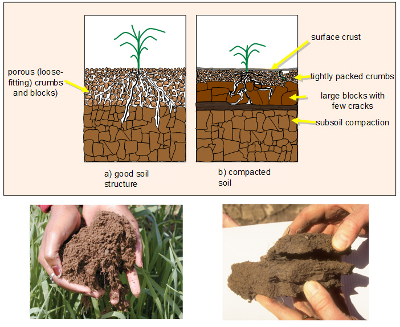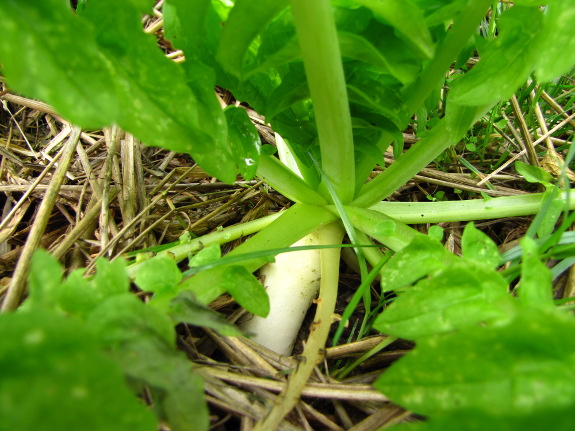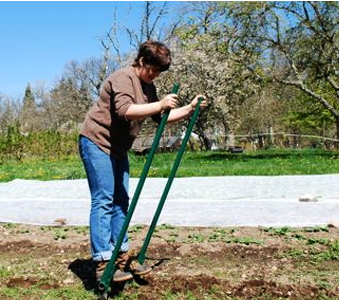
Dealing with soil compaction
 If
you don't want to destroy soil texture, burn up organic matter, and
decimate your microorganism population by plowing or tilling the soil,
what do you do to counteract compaction? Of course, your first step
should be not to allow compaction to begin in the first place. I've
trained everyone in our household (except Huckleberry) to only walk on
our permanent aisles, staying out of the growing beds in our garden, and
that goes a long way toward keeping soil compaction to a minimum. In
addition, if you're not tilling, you're unlikely to be working the soil
during wet weather --- another leading cause of compaction.
If
you don't want to destroy soil texture, burn up organic matter, and
decimate your microorganism population by plowing or tilling the soil,
what do you do to counteract compaction? Of course, your first step
should be not to allow compaction to begin in the first place. I've
trained everyone in our household (except Huckleberry) to only walk on
our permanent aisles, staying out of the growing beds in our garden, and
that goes a long way toward keeping soil compaction to a minimum. In
addition, if you're not tilling, you're unlikely to be working the soil
during wet weather --- another leading cause of compaction.
Still, who knows what
happened to your ground before you moved in? Our core homestead was
seriously overfarmed a few decades ago, and I can guess where permanent
pastures once existed based on barbed wire that we're still digging out
of the ground. Given the wetness of our homestead, I wouldn't be
surprised if cows (the most likely animals to have been grazed here)
seriously pugged winter soils, repeatedly treading the mud until all of
those essential pores between soil particles collapsed.
 If
you suspect compaction, there are a variety of remedies available for
the no-till gardener. Adding lots of organic matter never hurts and can
greatly improve your soil structure when earthworms collect the compost
or mulch and bring it deep into the soil, leaving handy channels for air
and water in the worms' wake. Oilseed radishes
and some other cover crops (such as alfalfa) are often planted for
their tillage traits since the roots extend deep in the soil, then rot
and create organic-matter-lined pathways much like the ones earthworms
leave behind.
If
you suspect compaction, there are a variety of remedies available for
the no-till gardener. Adding lots of organic matter never hurts and can
greatly improve your soil structure when earthworms collect the compost
or mulch and bring it deep into the soil, leaving handy channels for air
and water in the worms' wake. Oilseed radishes
and some other cover crops (such as alfalfa) are often planted for
their tillage traits since the roots extend deep in the soil, then rot
and create organic-matter-lined pathways much like the ones earthworms
leave behind.
And then there's the
broadfork. Given my penchant for winter digging, I've always eyed this
tool speculatively, but the high price tag turned me off since I wasn't
certain that my soil really needed the help. Still, leaving broadforks
out of my upcoming soil book seemed like a major oversight, and when one of the bloggers I follow did all of the research for me and determined that Meadow Creature
offers the best model in the U.S., I was sold. When I learned that
Meadow Creature was willing to send me a review copy to try out, I was
even more thrilled.
 The
big question then became --- which size broadfork should I choose?
Meadow Creature offers three versions, each of which is a little bit
bigger and heavier (and will also reach deeper into the soil) than the
last. Margot Boyer at Meadow Creature wrote, "The 14" is our best
seller; it weighs 20 pounds and provides deep cultivation in an
ergonomic design. The 12" is also popular, especially with people who
are 5'4" or under --- at 15 lbs it's easy for most folks to use and
still digs deeper than any other forks we're aware of. I'm not
suggesting the 16" size; it's a heftier tool and of interest mainly to
professional farmers."
The
big question then became --- which size broadfork should I choose?
Meadow Creature offers three versions, each of which is a little bit
bigger and heavier (and will also reach deeper into the soil) than the
last. Margot Boyer at Meadow Creature wrote, "The 14" is our best
seller; it weighs 20 pounds and provides deep cultivation in an
ergonomic design. The 12" is also popular, especially with people who
are 5'4" or under --- at 15 lbs it's easy for most folks to use and
still digs deeper than any other forks we're aware of. I'm not
suggesting the 16" size; it's a heftier tool and of interest mainly to
professional farmers."
After talking it over
with Mark, I finally settled on the smaller size. Yes, I consider myself
to be pretty strong, but I'm also short and I know that the 17-pound t-post driver
is right at the upper limit of my strength for repeated use. Plus,
experience has proven that tools are much more likely to be used if
they're easy to handle and fun.
Which is all a long way
of saying that, once the snow melts and my new toy arrives, I'll be
improving the structure of my garden beds with a broadfork this spring!
I'll probably begin by hitting just half of most beds the first time
around so I'll be able to report how much of a difference the broadfork
action makes on this year's plant growth. Stay tuned for updates!
Want more in-depth information? Browse through our books.
Or explore more posts by date or by subject.
About us: Anna Hess and Mark Hamilton spent over a decade living self-sufficiently in the mountains of Virginia before moving north to start over from scratch in the foothills of Ohio. They've experimented with permaculture, no-till gardening, trailersteading, home-based microbusinesses and much more, writing about their adventures in both blogs and books.
Want to be notified when new comments are posted on this page? Click on the RSS button after you add a comment to subscribe to the comment feed, or simply check the box beside "email replies to me" while writing your comment.

A] You've maligned our bovine friends. Their cloved hooves actually help prevent/repair compaction. Water logged soil gets compacted by sedimentation on a small scale, filling in those worm holes & small air spaces.
2] Don't compare the use of your 17lb t-post hammer, which you have to lift over your head and slam down awkwardly, with the slightly heavier pitch fork tool. It's doesn't have to be lifted high and is operated using leverage and you own body weight. Go for the big one!